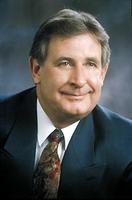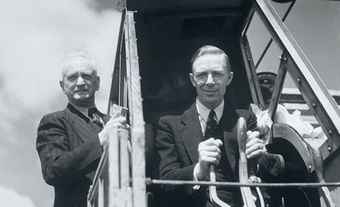
Ralph Klein, broadcaster, politician, premier of Alberta from 1992 to 2006 (born 1 November 1942 in Calgary, AB; died there 29 March 2013). After a 10-year career as a radio and TV broadcaster in Calgary, Klein entered the Calgary mayoral race in 1980 as a decided underdog. His down-to-earth style - and a clever campaign orchestrated by the man who would guide his political career for the next 17 years, Rod Love - attracted enough voter support to upset 2 strong candidates including the incumbent. Folksy and humorous, his manner made him one of Calgary's most popular mayors. His most significant achievement as mayor was bringing the 1988 Winter Olympic Games to Calgary.
After a brief flirtation with the provincial Liberals, Alberta premier Don GETTY persuaded Klein to run as a Conservative provincially. Klein was elected to the legislature in the riding of Calgary-Elbow in 1989 and was immediately named minister of the environment. In Dec 1992 he succeeded Getty as Tory leader and premier, largely on the strength of his populist appeal to rural Alberta voters. Saddled with a large deficit from the previous Tory government, Klein nevertheless was able to distance his government from his predecessor's policies and ride his popular appeal to a victory over the Liberals in the provincial election on 15 June 1993.
Klein's government introduced legislation that required the government to balance its budget by 1996-97. To accomplish this, the Tories implemented severe expenditure cuts, government downsizing, and the privatization of some services. A series of severe expenditure cuts was met with little resistance from a population intent upon seeing its financial house put in order. At the same time, the government expanded government-run gambling, which proved to be a windfall. The cost cutting and the revenue generation succeeded, and thereafter the Tories recorded a series of budgetary surpluses. Their success had a wide influence on other provincial governments, which began to duplicate Alberta's cost-saving measures.
Klein's government was elected to a second term on 11 March 1997, largely on the strength of the government's financial record and the premier's personal popularity. The government then slowed its debt reduction and began to reinvest in programs such as health and education.
The period between 1997 and 2001 saw the Alberta government's coffers bolstered by higher oil and gas royalties. Klein pointed to these surpluses as proof that his government's economic agenda of low taxes and minimal government - often termed the "Alberta advantage" - was working. The government continued pursuing deregulation and privatization, while lowering taxes still further. Chief examples of these were the deregulation of electricity throughout the province, the efforts to incorporate private clinics and hospitals into the health-care system, and the adoption in 2001 of a single-rate tax system for all Albertans.
Flush with cash, Klein's government went to the polls on 12 March 2001. The Tories won again, taking 74 of 83 seats, while the Liberals and New Democrats were reduced to 7 and 2 seats respectively. Klein's government subsequently faced more difficult times, however. A temporary drop in oil and gas prices, combined with over a billion dollars lost in moving to the new tax regime, created a brief revenue crisis. In its budget of early 2002, the Klein government introduced a series of unpopular taxes, including a rise in health-care premiums. The government also had to deal with a bitter teachers' strike. Finally, Klein's own behaviour on occasion and his own admittance of an alcohol problem raised public questions of his performance.
The 2004 provincial election saw the Conservatives again win a majority, but their seat total dropped to 62 of 83 seats while their popular vote similarly dropped to 47 percent as a large number of voters stayed home rather than cast a ballot. Klein's personal popularity remained high among many Albertans, but the election and its aftermath also reflected growing disenchantment with his leadership and much of his government's austerity platform. At times, the party and the government seemed curiously both rudderless and authoritarian, making decisions based solely on the apparent whims of Klein. These concerns came to a head at the Conservative Party convention in March 2006. Asked to vote on a leadership review, Conservative delegates gave Klein only 55 percent support. Stunned by the rebuke, Klein shortly thereafter announced he would be stepping down at premier later that fall. This came to pass on 2 December 2006, when the Conservative party chose Edward STELMACH as its new leader and premier of Alberta.
Following retirement, Klein was offered a position at the Calgary law firm Borden Ladner Gervais as its senior business adviser. He also received numerous awards, including Officer of the Order of the Legion of Honour by the Government of France (2008) and an Honorary Doctor of Laws Degree from the UNIVERSITY OF CALGARY (2011). In 2012, he was made a member of the ORDER OF CANADA.

 Share on Facebook
Share on Facebook Share on X
Share on X Share by Email
Share by Email Share on Google Classroom
Share on Google Classroom

